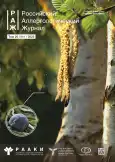Familial case of hereditary angioneurotic angioedema, caused by deficiency in the C1 inhibitor complement system
- 作者: Kovzel E.F.1, Nurpeisov T.T.2, Gani B.1, Volodchenko S.A.1, Zhamanbaeva Z.Z.1, Syzdykova A.B.1, Batyrbaeva A.Z.2
-
隶属关系:
- Corporate Fund «University Medical Center», Program of Clinical Allergology Immunology
- Scientific research Institute of Cardiology and Internal diseases
- 期: 卷 20, 编号 1 (2023)
- 页面: 104-111
- 栏目: Case reports
- URL: https://bakhtiniada.ru/raj/article/view/133026
- DOI: https://doi.org/10.36691/RJA1556
- ID: 133026
如何引用文章
全文:
详细
This study revealed primary immunodeficiency developing as a result of a genetically mediated quantitative deficiency or a decrease in the activity of the C1 component complement inhibitor in a family clinical case of patients with genetically confirmed hereditary angioedema, who were living in Taldykorgan, Almaty, Republic of Kazakhstan.
Anamnesis data and clinical and laboratory-instrumental indicators were evaluated. In addition to assessing the objective status and general clinical laboratory studies, all patients underwent studies to determine the quantitative content of C4 and C1 inhibitor of the complement component and the presence of a mutation in the SERPING1 gene.
The polymorphism of clinical and anamnestic data did not allow timely identification of specific syndromes and determination of a clinical diagnosis. As a result, specific basic treatment, preventive measures, and preventive intervention associated with traumatic life and medical situations were given late, leading to life-threatening conditions.
The main clinical manifestations of hereditary angioedema are recurrent dense edema, lasting 2–5 days. The skin, upper respiratory tract, and gastrointestinal tract are the organs most involved. Clinical manifestations in patients vary dramatically, from the absence of characteristic symptoms to life-threatening edema, leading to death.
作者简介
Elena Kovzel
Corporate Fund «University Medical Center», Program of Clinical Allergology Immunology
编辑信件的主要联系方式.
Email: Elena.Kovzel@umc.org.kz
ORCID iD: 0000-0002-2383-0264
SPIN 代码: 9274-1640
MD, Dr. Sci. (Med.), Professor
哈萨克斯坦, AstanaTair Nurpeisov
Scientific research Institute of Cardiology and Internal diseases
Email: dr.tt@mail.ru
ORCID iD: 0000-0002-9590-8905
SPIN 代码: 2611-7279
MD, Dr. Sci. (Med.), Professor
哈萨克斯坦, AlmatyBayan Gani
Corporate Fund «University Medical Center», Program of Clinical Allergology Immunology
Email: gani.bayan96@gmail.com
ORCID iD: 0000-0002-0897-6353
哈萨克斯坦, Astana
Svetlana Volodchenko
Corporate Fund «University Medical Center», Program of Clinical Allergology Immunology
Email: svetlanasv888@mail.ru
ORCID iD: 0000-0002-7577-5172
SPIN 代码: 2653-3388
哈萨克斯坦, Astana
Zhanagul Zhamanbaeva
Corporate Fund «University Medical Center», Program of Clinical Allergology Immunology
Email: alem2005@mail.ru
SPIN 代码: 9530-3672
哈萨克斯坦, Astana
Asiya Syzdykova
Corporate Fund «University Medical Center», Program of Clinical Allergology Immunology
Email: asiya-15@mail.ru
ORCID iD: 0000-0002-4682-7412
哈萨克斯坦, Astana
Aray Batyrbaeva
Scientific research Institute of Cardiology and Internal diseases
Email: aikoshny@mail.ru
ORCID iD: 0000-0001-9987-4741
SPIN 代码: 6455-2943
哈萨克斯坦, Almaty
参考
- Belevtsev MV, Sharapova SO, Uglova AP. Primary immunodeficiencies. 2nd ed. Minsk: Vitposter; 2016. 58 p. (In Russ).
- Bork K, Zibat A, Ferrari DM, et al. Hereditäres angioödem in einer familie mit spezifischen mutationen sowohl im plasminogen- als auch im SERPING1-Gen. J Dtsch Dermatol Ges. 2020;18(3):215–224. (In German). doi: 10.1111/ddg.14036_g
- Xu YY, Gu JQ, Zhi YX. Hereditary angioedema caused by a premature stop codon mutation in the SERPING1 gene. Clin Transl Allergy. 2020;10(1):53. doi: 10.1186/s13601-020-00360-9
- Blanch A, Roche O, Urrutia I, et al. First case of homozygous C1 inhibitor deficiency. J Allergy Clin Immunol. 2007;118(6):1330–1335. doi: 10.1016/j.jaci.2006.07.035
- Bork K, Staubach P, Eckardt AJ, Hardt J. Symptoms, course, and complications of abdominal attacks in hereditary angioedema due to C1 inhibitor deficiency. Am J Gastroenterol. 2006;101(3):619–627. doi: 10.1111/j.1572-0241.2006.00492.x
- Maurer M, Magerl M, Ansotegui I, et al. The international WAO/EAACI guideline for the management of hereditary angioedema--The 2017 revision and update. Allergy. 2018;73(8):1575–1596. doi: 10.1111/all.13384
- Maurer M, Magerl M, Betschel S, et al. The international WAO/EAACI guideline for the management of hereditary angioedema--The 2021 revision and update. World Allergy Organ J. 2022;15(3):100627. doi: 10.1016/j.waojou.2022.100627
- Bork K. Acquired and hereditary forms of recurrent angioedema: Update of treatment. Allergol Select. 2018;2(1):121–131. doi: 10.5414/ALX1561E
- Can PK, Rmentepe EN, Etikan P, et al. Assessment of disease activity and quality of life in patients with recurrent bradykinin-mediated versus mast cell-mediated angioedema. World Allergy Organ J. 2021;14(7):100554. doi: 10.1016/j.waojou.2021.100554
补充文件






